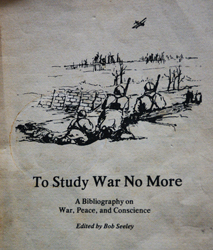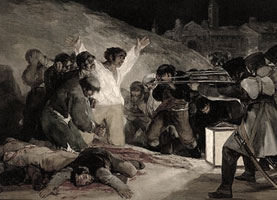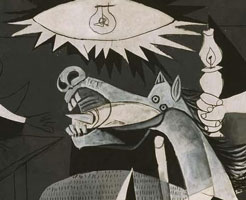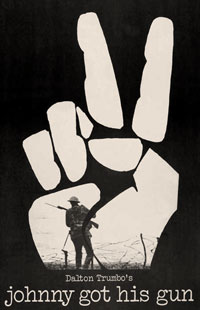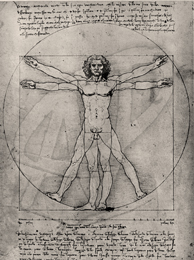Resources
"The most successful tyranny is not the one that uses force to assure uniformity but the one that removes the awareness of other possibilities, that makes it seem inconceivable that other ways are viable, that removes the sense that there is an outside." ― Allan Bloom
Inspiration
This page is inspired by a pamphlet from 1979 called “To Study War No More: A Bibliography on War, Peace, and Conscience”, edited by Bob Seeley and distributed by the Central Committee for Conscientious Objectors. In that year, near the height of the Cold War when there were over 52,000 nuclear warheads between the U.S. and the U.S.S.R. alone, it was comforting to find a listing of alternate sources of information, back in those pre-internet dark ages.
This is not meant to be a comprehensive list of resources on liberty, peace and the Non-Aggression Principle but a broad sampling of works that may inspire and challenge the reader.
Heroic Reporting
Most people understand that the 1st Amendment to the U.S. Constitution does not limit free speech to a chosen or wealthy few. Strangely, however, some people seem to think that freedom of the press should be limited to a self-selected club. Certainly, a degree in journalism was not a requirement for membership in the press in the early days of the Republic.
With the availability of the World Wide Web, anyone with a computer or smart phone and a connection to the internet can now be a reporter. We the people are no longer hampered by the need for a massive investment in printing or broadcasting equipment, nor do we need to rely on a news organization's approval to get an edited "letter to the editor" published. This is very timely as the bias of the New York Times, the Wall Street Journal and other "news" organizations is becoming increasingly obvious. Fortunately they are rapidly losing their audience and the power to filter and distort the truth or to be used as a tool of the State. With the flood of independent voices available, the task now becomes knowing how to separate fact from fiction and finding people to trust.
Websites
The number of sites devoted to liberty and peace is growing rapidly. Here are a few worth visiting regularly.
Antiwar.com: Antiwar news, viewpoints, and activities. No, they don't "hate us for our freedoms". If you really want to understand the full impact of U.S. wars and covert operations, this is the place to start. If you are still pro-war after spending a week at this site, you really aren't paying attention.
Lew Rockwell: Anti-State, Anti-War, Pro-Market. No longer limited to a small group that could fit into Murray N Rothbard's apartment, this site demonstrates the diversity of opinion among anarcho-libertarians. A longtime favorite of mine, I visit this site daily.
The Brownstown Institute: Created as a response to the destructive and authoritarian reactions of governments across the globe to the Covid-19 outbreak, the mission of the Brownstone Institute "is constructively to come to terms with what happened, understand why, discover and explain alternative paths, and seek reforms to prevent such events from happening again. Lockdowns and mandates have set a precedent in the modern world and without accountability, social and economic institutions will be shattered once again."
The Libertarian Institute: Top notch news and education site from a libertarian perspective.
Ron Paul Liberty Report: Provides coverage and analysis of recent developments impacting civil liberties, foreign policy and economics. There is also a daily video report.
Mises Institute: An educational institution dedicated to freedom and peace through the teaching of Austrian economics.
Future of Freedom Foundation.: An excellent eduction site promoting individual liberty, free markets, private property and limited government.
Foundation for Economic Education: Another great education site dedicated to promoting the peaceful operation of the free market.
Independent writers
A relative newcomer, Substack provides independent writers and thinkers with a forum where the can present unfiltered facts and opinions and receive compensation through small donations from supportive readers. Here are some of my favorites:
Glenn Greenwald: A truly heroic journalist, an honest voice in the tradition of classic liberals who placed a high value on freedom of speech and thought. A great ally to the antiwar movement as well.
Caitlin Johnstone: A fierce and relentless opponent of warmongers, corrupt politicians and other assorted liars. I had the pleasure of seeing a presentation by her, via video feed from Australia, at a Ron Paul conference a few years back. Caitlin is passionate and brutally honest.
Podcasts
Just as the internet has created a challenge to traditional print journalism, it has also created an alternative to television news and talk radio through the efforts of thousands of independent podcasters. The last couple of years has seen an explosion of podcasts presenting anarcho-libertarian viewpoints. Here are just a few of them.
The Tom Woods Show: Great podcast of conversations and interviews on a wide range of topics from an anarcho-libertarian perspective. Tom has interviewed some of the greatest voices for freedom in our time, from veteran libertarians and antiwar advocates such as Lew Rockwell, Ron Paul and Walter Block to more recent entrants such as Scott Horton, Angela Keaton, Jason Stapleton, Stepan Kinsella and Adam Kokesh.
Part of the Problem. Hosted by Dave Smith. This professional comic really knows his stuff. Discussing topics in the news and popular culture from a pro liberty\antiwar perspective, this guy has a sharp wit and mind on the level of George Carlin.
Counterflow. Hosted by Buck Johnson, the Counterflow podcast is a weekly show featuring discussions and interviews with people who are outside of and critical toward mainstream liberal and conservative politics.
Addressing cultural and lifestyle issues as well as philosophy and politics, it is a show that challenges the conventional right/left binary. More concerned with the more important distinction of free vs unfree, the show features thinkers from a variety of backgrounds, including many who do not fit into the narrow framework of fashionable opinion.
Lions of Liberty. Hosted by Marc Clair, this podcast is full of positive energy in its interviews and discussions of foreign policy, economics and culture.
Free Domain Radio: Billing itself as "The Largest Philosophy Conversation in the World", its host Stefan Molyneux is interested in more than just libertarian theory. Stefan explorers the various cultural elements needed to build a more peaceful and productive society. He also has a YouTube channel called The Truth About Series that discusses stories in the news.
Free Man Beyond the Wall. Hosted by Pete "Mance Rayder" Quinones. This fan of the Game of Thrones is passionate about liberty and peace. He has done a number of great interviews and is a lot of fun to listen to.
Patterson in Pursuit. Steve Patterson is a man on a mission, circling the globe, conducting interviews and testing his own beliefs as an anarcho libertarian.
Videos
Is the Price Worth It?: News reporter Leslie Stahl asks then Secretary of State Madeleine Albright about the deaths of 500,000 Iraqi children. The shocking answer, little reported in the U.S., certainly reverberated across the Middle East. In just 24 seconds this video speaks volumes about the true nature of the U.S. empire.
Collateral Murder: It is the bravery of whistleblowers like Private Manning and the organization Wikileaks.org that has made this information available. The video of U.S. soldier Ethan McCord's eyewitness story is especially powerful. The "double tap" firing on civilians, including two young children, who were trying to aid a wounded man is particularly horrendous.
The Arts
"Art is a lie that makes us realize truth." - Pablo Picasso
To embrace the Non-Aggression Principle is to embrace the freedom to explore and discover. Through the arts we can find alternate perspectives and approaches to often difficult and troubling problems.
Paintings
The fine art of painting has a long tradition of embracing the aesthetic of beauty. Using painting to depict and critique something as brutal and ugly as war can therefore be a challenge. The Dada movement of the early 20th century[1] was one such attempt, created as a reaction to the horror of the First World War. The works listed below are other noble attempts to transform and broaden the painterly tradition.
Third of May 1808 by Francisco Goya. The painting was commissioned to celebrate Spanish resistance to Napoleon’s army. Between 1810 and 1820, Goya did a series of prints known as the
Disasters of War. This painting breaks ground with the traditional heroic depictions of war to focus on the execution of a resister with arms splayed in the form of a sacrificial crucifixion.
The painting inspired Picasso's
Guernica, discussed below, and his protest against U.S. intervention in the Korean War called
Massacre in Korea.
Guernica by Pablo Picasso. The painting was created in reaction to the German bombing of the Basque town of Guernica during the Spanish Civil War. Painted in a cubist style, the sharp lines and muted tones of the painting perfectly express the shock and horror of that atrocity.
A powerful commentary on the destructive nature of war, a tapestry copy hangs in the United Nations headquarters in NYC.
Ironically, the work was covered by a curtain on February 5, 2003 while the US Secretary of State argued for going to war against Iraq on what were ultimately shown to be false pretenses.
Movies
“I feel I owe you an apology. We have a rule. We never free a mind once it's reached a certain age. It's dangerous, the mind has trouble letting go. I've seen it before and I'm sorry. I did what I did because..I had to..” ― Morpheus, character in the movie "The Matrix"
As with painting, the cinematic creation of a truly antiwar work can be difficult. The often heroic betrayal of characters can mute the true horror of battle. Additionally, the increasingly detailed depictions of battle can fool us into thinking we are experiencing it fully as we sit comfortably in our seats, risking neither death nor injury, experiencing neither the excruciating pain nor the ghastly smells that accompany war.
Listed below are a few movies that offer alternate perspectives on war, the nature of violence, and alternatives to aggression.
Joyeux Noel (Merry Christmas). A dramatized account of the famous Christmas Truce of 1914 in the first year of the "Great War", World War I.
Gandhi. The Hindu Mohandas Gandhi had the audacity to actually implement the teachings of Jesus Christ. His non-violent action became the model for Martin Luther King Jr. and the civil rights movement.
Good Morning Vietnam. Featuring Robin Williams at his most creative, this movie demonstrates that war has little interest in truth. The segment featuring Louis Armstrong singing "What a Wonderful World" is extremely powerful.
Dr. Strangelove, Or: How I Learned to Stop Worrying and Love the Bomb . A satire on the absurdity of the nuclear arms race and war in general. Remember gentlemen, there is no fighting in the war room.
Born on the Fourth of July. Ron Kovic is a real person who really was born on the Fourth of July. As a patriotic U.S. citizen, he volunteered to go into the military during the U.S. war against Vietnam. This dramatized version of his life covers his transformation from warrior to anti-war protester.
Full Metal Jacket. The stunning transformation of a joker into a killer.
War Games. Although technology has advanced a bit since this movie was made, this original version still retains a powerful impact.
Heroic Fiction
Stories about war and its destruction go back at least 3000 years to the Iliad. Here are a few books with the power to change lives.
Johnny Got His Gun by Dalton Trumbo. A powerful description of the impact of war on a single human life. With advances in technology, the scenario laid out in this book is even more realistic and frightening than when first written decades ago.
One Day in the Life of Ivan Denisovich by Alexander Solzhenitsyn. The Soviet Union was once mistakenly described as a workers paradise by naive Western Leftists. This book describes an average day in one of the Soviet labor camps of the 1950s.
1984 by George Orwell. It is all here: Big Brother, Thought Police, Thoughtcrime, Doublethink, Newspeak, War is Peace, Freedom is Slavery, the Ministry of Truth, Unpersons, Room 101, Down the Memory Hole and the Two Minutes Hate. When an author’s name becomes an adjective used by millions of people to critique subversive government activities and the manipulation of language, there is little doubt that the author has said something significant.
The Hunger Games Trilogy by Suzanne Collins. A powerful commentary on politics, warfare and reality T.V. Meet the new boss, same as the old boss.
Slaughterhouse Five by Kurt Vonnegut. A survivor of the Allied bombing of Dresden, Kurt Vonnegut draws on the absurdity of his experience to create a mind altering antiwar novel.
Catch 22 by Joseph Heller. Another great mind bending satire from a WWII vet on the absurdity of war.
Nonfiction
The arts have the power to move people through emotion. Equally important is the ability to articulate arguments for peace and liberty through logic and evidence. Listed below are collections of books certain to challenge and provide new viewpoints.
Opening Minds
The nonfiction books in this section may seem at first to have little to do with libertarianism. They are listed here in an attempt, for those who are ready, to break open minds and to shake loose the cobwebs of antiquated lines of thought.
Progress is brought by challenging those excepted truths that are based on faulty evidence or sloppy reasoning. As in the expression "Zen mind, beginners mind", to truly understand a topic we must be willing to approach it with fresh eyes and an open mind, freeing ourselves of the trappings of erroneous models of reality.
The Invisible Gorilla: How Our Intuitions Deceive Us. This is not a clever philosophical treatise on the nature of reality. Instead this book provides startling yet irrefutable evidence of how erroneous human observations and conclusions can be.
Obedience to Authority: An Experimental View by Stanley Milgram. Through a series of experiments conducted after World War II, Stanley Milgram found disturbing evidence of how far many people will go in their obedience to authority.
Economics in One Lesson: The Shortest and Surest Way to Understand Basic Economics by Henry Hazlit. This book is probably one of the most frequently recommended books by fellow libertarians. Makes seemingly controversial topics such as tariffs, minimum wage, unemployment, rent control and other topics easy to understand. Emphasizes the importance of evaluating the "unseen" when making economic decisions.
Freakonomics: A Roque Economist Explores the Hidden Side of Everything . Challenging common assumptions regarding crime, parenting, education, sports and other topics, the authors dig through the data to find that the reality is often very different. Less focused and more freewheeling than "Economics in One Lesson", this book is a fun read.
Guns, Germs, and Steel: The Fates of Human Societies . Provides powerful evidence of how geography and environment influence the development of culture. Although environment is not destiny, it does wield a powerful impact.
Zen and the Art of Motorcycle Maintenance: An Inquiry into Values . Attempts to reconcile classical and romantic approaches to art, philosophy and living. If the libertarian movement is to grow, it must move beyond purely rational discourse and provide greater emotional appeal.
Alternate Perspectives
War Is A Racket!: And Other Essential Reading by Smedley Butler. The author was a Major General and the most decorated U.S. soldier of his time. A recognized leader in Europe during the First World War, he also led several military actions in the Caribbean and Central America. In this short work General Butler describes how he and hundreds of thousands of others were used for questionable purposes with regrettable results. This work has lost none of its impact and relevance.
Beyond the Green Zone: Dispatches from an Unembedded Journalist in Occupied Iraq by Dahr Jamail. The author was NOT an imbedded reporter within the U.S. military and was thus able to describe the Iraq war from the perspective of civilians. Bravely entering places few other journalists did, Jamail was able to report: "The display of brute force that the U.S. military unleashed on the people of Fallujah underscored how the guerrillas had Goliath both frustrated and angry. As the occupation forces rushed headlong into this trap, the message was clear to all Iraqis: their well-being was of little or no interest to the occupiers who had come to "liberate" them."
We Who Dared to Say No to War: American Antiwar Writing from 1812 to Now edited by Murray Polner and Thomas E. Woods Jr. The antiwar movement did not start in the 1960's. As this book of collected writings indicates, there is a long history of opposition to war within the United States.
A Renegade History of the United States by Thaddeus Russell. Throughout history there have been people opposed to the mixing of the "races" who were willing to use the power of the State to enforce their will. In the United States, this led to the creation of segregation laws at the local, state and national levels. What this book makes clear is that people of all stripes have been mixing, through social and sexual intercourse, for millennia. Apparently girls (and boys) just want to have fun.
Dismantling the Myths
"The truth, indeed, is something that mankind, for some mysterious reason, instinctively dislikes. Every man who tries to tell it is unpopular, and even when, by the sheer strength of his case, he prevails, he is put down as a scoundrel." - H. L. Mencken
American Wars: Illusions and Realities, edited by Paul Buchheit. A collection of writing that challenges government propaganda and myths such as: "We fight for peace and democracy" and "We fight to defend our personal freedom.
Excuse Me, Professor: Challenging the Myths of Progressivism, edited by Lawrence W. Reed. Challenges common myths about resource scarcity, income inequality, human rights and many other topics in vogue among "progressives" today.
Race And Culture: A World View by Thomas Sowell. Demonstrates that cultural elements such as the propensity to save and postpone gratification have a much greater impact on the success of a group then any perceived prejudice from other groups or individuals. The empirically measurable success of the free market trumps any Marxist theory regarding the exploitation of the masses.
Preferential Policies: An International Perspective by Thomas Sowell. Since the diagnosis is incorrect, as demonstrated in his book Race and Culture, it is not surprising that the "treatments" that governments implement often make things far worse. In this book Thomas Sowell shows that, across the globe, whenever governments create programs to favor one group over another, the results tend to be disastrous and usually intensify conflicts between groups. Sowell also reminds us that the Jim Crow segregation laws in the U.S. were often opposed by businesses and that economic forces are much more effective at improving conditions for almost everyone.
Busting Myths About the State and the Libertarian Alternative by Zack Rofer. With humor and precision, the author applies a 50 lb sledgehammer of reason and evidence to many of the most cherished myths of the state. This is not a book about destruction, however, for from the rubble of statist absurdities the author joyously builds the libertarian case for using peace and liberty to revitalize our culture.
Challenging the Status Quo
Rogue State: A Guide to the World's Only Superpower by William Blum. In a chapter called "Perverting Elections", the author reviews a few of the many occasions where the U.S. government has interfered in elections across the globe.
Killing Hope: U.S. and C.I.A. Interventions Since World War II by William Blum. Details over 50 military and covert operations conducted by the U.S. government since WWII. No, they don't hate us for our freedoms, they hate us for the violence and destruction these "interventions" have caused. To make it clear that the U.S. empire did not begin at the end of World War II, the author includes an appendix of over 160 other U.S. military inventions, from Latin America to East Asia, in the years from 1798 to 1945.
Overthrow: America's Century of Regime Change from Hawaii to Iraq by Stephen Kinzer. If you still believe that the United States is not an empire after reading this and the two books by William Blum, you really haven't been paying attention.
Resurgence of the Warfare State: The Crisis Since 9/11 by Robert Higgs. A collection of essays written in the first few years after the 9/11 suicide attacks in the U.S. The collection shows the author challenging the hysteria following the attacks and correctly predicting many of the disastrous consequences to liberty and the economy.
Greatest Emancipations: How the West Abolished Slavery by Jim Powell. Those with little knowledge of history like to criticize western nations for their previous support of slavery. The actual record shows that slavery was a global phenomenon that had existed for millennia and that industrialized nations, led by the United Kingdom, were the first to eliminate the inhuman practice. Even more significantly, the author shows that the less violence that was used in the emancipation process, the better was the outcome.
Confessions of a Greenpeace Dropout: The Making of a Sensible Environmentalist by Patrick Moore. The author is a cofounder of Greenpeace that obviously cares deeply about the environment. He broke from Greenpeace at a time when it was rapidly becoming anti-humanity. The author argues that humans are as much a part of nature as anything else and that there can be a balance that benefits all life.
Powerful Voices
Classified Woman-The Sibel Edmonds Story: A Memoir by Sibel D Edmonds. If you thought that a concerned government worker, armed with embarrassing but timely information soon after the 9/11 attacks, would be heard if they followed the proper channels, think again.
The Costs of War
"Of all the enemies to public liberty war is, perhaps, the most to be dreaded, because it comprises and develops the germ of every other..No nation could preserve its freedom in the midst of continual warfare." - James Madison
Blowback: The Costs and Consequences of American Empire by Chalmers Johnson. Written before the 9/11 suicide attacks against the U.S., the author warned of the repercussions of U.S. military and covert actions across the globe. This book is the first of what has become known as the Blowback Trilogy. Other books in the series include Nemesis: The Last Days of the Republic and The Sorrows of Empire: Militarism, Secrecy, and the End of the Republic.
The Complex: How the Military Invades Our Everyday Lives by Nick Turse. In 1960, outgoing U.S. president Dwight D. Eisenhower warned of the threat and growing influence of the military industrial complex. He would likely be astounded and dismayed at its growth and pentration into many elements of U.S. culture, from sporting events to Hollywood films. The author pulls back the curtain and reveals a culture that has been infected by militarism at so many levels.
The Corruptive Force of Government
Doublespeak by William Lutz. Language is anarchy. There is no centralized government or institution that controls it. Language is instead the result of the interactions of thousands if not millions of people who desire to communicate with each other. Governments have a different agenda, however. They seek to bend and distort language to create an artificial reality, a world where the aggressive actions of the State have no negative consequences. The author of this book includes examples of businesses distorting language as well, but what is amazing is how often these businesses recruit various government departments to deceive the public.
Setting the Record Straight
A Century of War by John V Denson. Provides an alternate perspective to the U.S. wars from the 1860's through to the Cold War. If you have swallowed the Statist Kool-Aid regarding those "heroic" wars, this quick and easy read may be the quickest antidote.
33 Questions About American History You're Not Supposed to Ask. by Thomas E Woods. Reviewing the historical record, the author dispels a number of myths regarding immigration, affirmative action, the "Wild West", and the Great Depression, among other topics.
Lincoln Unmasked: What You're Not Supposed to Know About Dishonest Abe by Thomas DiLorenzo. In his two books on Lincoln, DiLorenzo's dares to pierce the myth and effectively challenges the fabrications of the Lincoln cult.
Lies My Teacher Told Me: Everything Your American History Textbook Got Wrong by James W. Loewen. For those skeptical of the version of U.S. history presented in public schools, this book confirms that skepticism and fills in the blanks for what was left out.
On the Open Road
Iranian Rappers and Persian Porn: A Hitchhiker's Adventures in the New Iran. This book does the one thing that most frightens the U.S. empire: It humanizes the people of Iran, revealing them to be kind, curious and ready for change.
Factory Girls: From Village to City in a Changing China. The market reforms implemented by Deng Xiaping in the late 1970s unleashed a wave of industrial growth and internal migration unprecedented in history. This is a peek into a few of the lives impacted in the early years of the millennium.
Investment Biker: Around the World with Jim Rogers. This book documents the first of Jim Rogers two record breaking global journeys. This first one, completed on motorcycle with a fellow cyclist who also happened to be his girlfriend, crossed 52 countries and covered over 100,000 miles in 22 months. Along the way, the author provides great insights on culture, economics and the corruption and destructive force of governments.
Adventure Capitalist: The Ultimate Road Trip by Jim Rogers. This book documents a second record breaking road trip by the famed investor, this time in a custom-built yellow Mercedes convertible. Covering 116 countries and 152,000 miles during the course of the three year trip, his trip is also documented on his website JimRogers.com.
____________________________________________
Notes
1. ^ The Dadaist artists, while correctly ridiculing the violent nature of the State and its wars, unfortunately aligned themselves with the radical left and its rejection of the free market. This misdiagnosis of the causes of war was repeated by the counterculture movement in the 1960's and 1970's.


